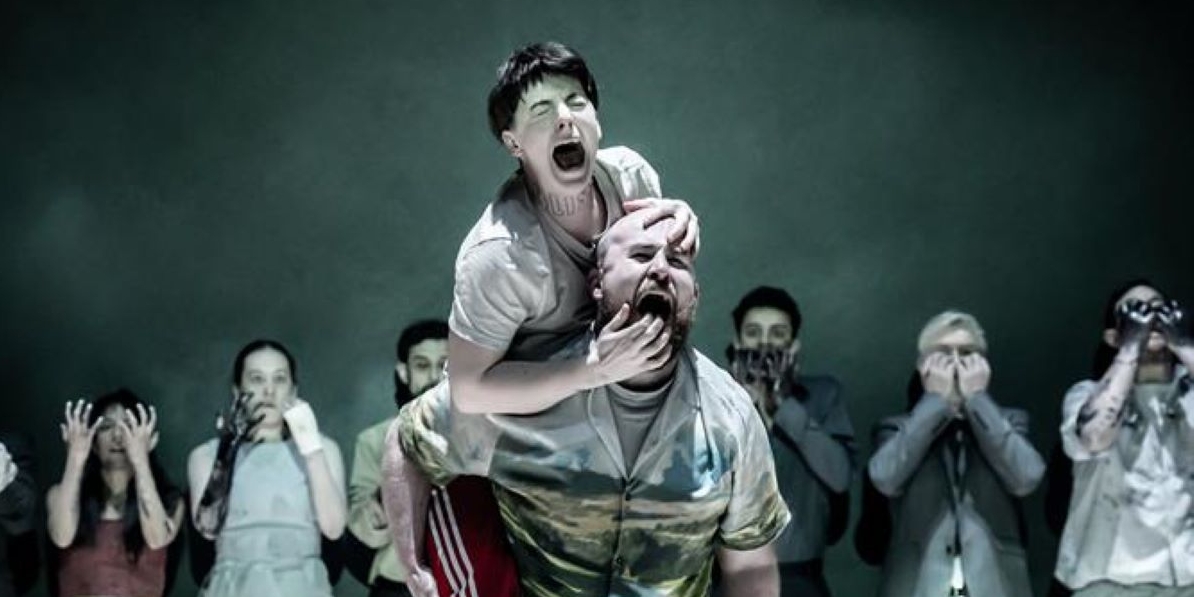I was certainly lucky to be at a performance of Shakespeare’s Julius Caesar at the RSC in Stratford that had a Question and Answer session afterwards with the interesting director Atri Banerjee, the Assistant Director Chloe Christian, and four of the main performers. Because of this experience I am much more intellectually interested in and understanding of the artistic choices made for this production. During the performance I had been consistently puzzled by the fact of the casting of many of the main conspirators by female actors. The explanation: this was a way of updating the story of the politics of 44 BC to reflect the kind of political leadership we have in the UK today— governments mixed by sex and race.
I had been puzzled, too, by the three striking episodes of dance/movement in the show. Explanation: the opening episode conveyed the united crowd celebrating the Lupercal; the second was about the chaotic reactions to the assassination; and the third was to portray the militarism that followed the assassination and the Civil War. None of this was evident to me without the explanatory notes. I really liked the people taking part in the Q and A. I felt they were energetic, articulate, intelligent and creative. But my major problem is that the production itself communicated very little of Julius Caesar the drama to me. I was only fitfully engaged in the action; I had trouble hearing a good deal of the dialogue, a technical issue they need to watch out for; and most of the time I got virtually no sense of who each character was.
That said, I could appreciate the commitment of the cast and their dedicated hard work. Mark Antony was the only character who fully worked for me. He did a fine, dramatic job with the funeral of Caesar. And I like the intellectual constructs that were explained to me as much as I liked the very finely constructed and thought-through sets and costumes by Rosanna Vize and Tomas Palmer. I didn’t mind their updating the action to the present to make the connection clearer with the politics of Elizabethan England that Shakespeare was reflecting in telling the story of politics in Ancient Rome. The problem was, for me, that throughout the evening, except for a few episodes and Mark Antony’s Big Moment, I felt consistently disengaged. The thought processes behind the interpretation of the play seemed to me messily imposed on the production rather than teased out of the subtext of the play itself. Henry James used to say that you must accept and start with the “given” in any work of art, and I felt that this production was merely exploiting the text to portray its own superimposed given. To me there was no really organic connection of the text to the production.
The applause at the end was very strong and the predominantly young audience was clearly receptive to this approach. I suspect many of them were studying the play and that for them this reading was refreshing. Nigel Barrett as Julius Caesar made a strong impression; Thalissa Teixeira had a captivating stage presence as Brutus; Kelly Gough was interesting as Cassius and William Robinson was impressive as a young Mark Antony. I liked Calpurnia as played by Jimena Larraguivel, and found Nadi Kemp-Sayfi’s Portia touching. The actors worked together as a genuine ensemble, doing a professional job throughout. Yet despite my respect for the attempt, I am afraid this production seemed to me to fail. So I suggest that f you want to experience the play Julius Caesar by the RSC perhaps you might try the DVD of the Greg Doran production. Or consider the old MGM movie with Marlon Brando as a compelling Mark Antony, James Mason as a tortured Brutus, John Gielgud as a sneaky Cassius and the wonderful Louis Calhern as Julius Caesar. The film has an outstanding cast sensitively directed by Joseph L Mankiewicz.

